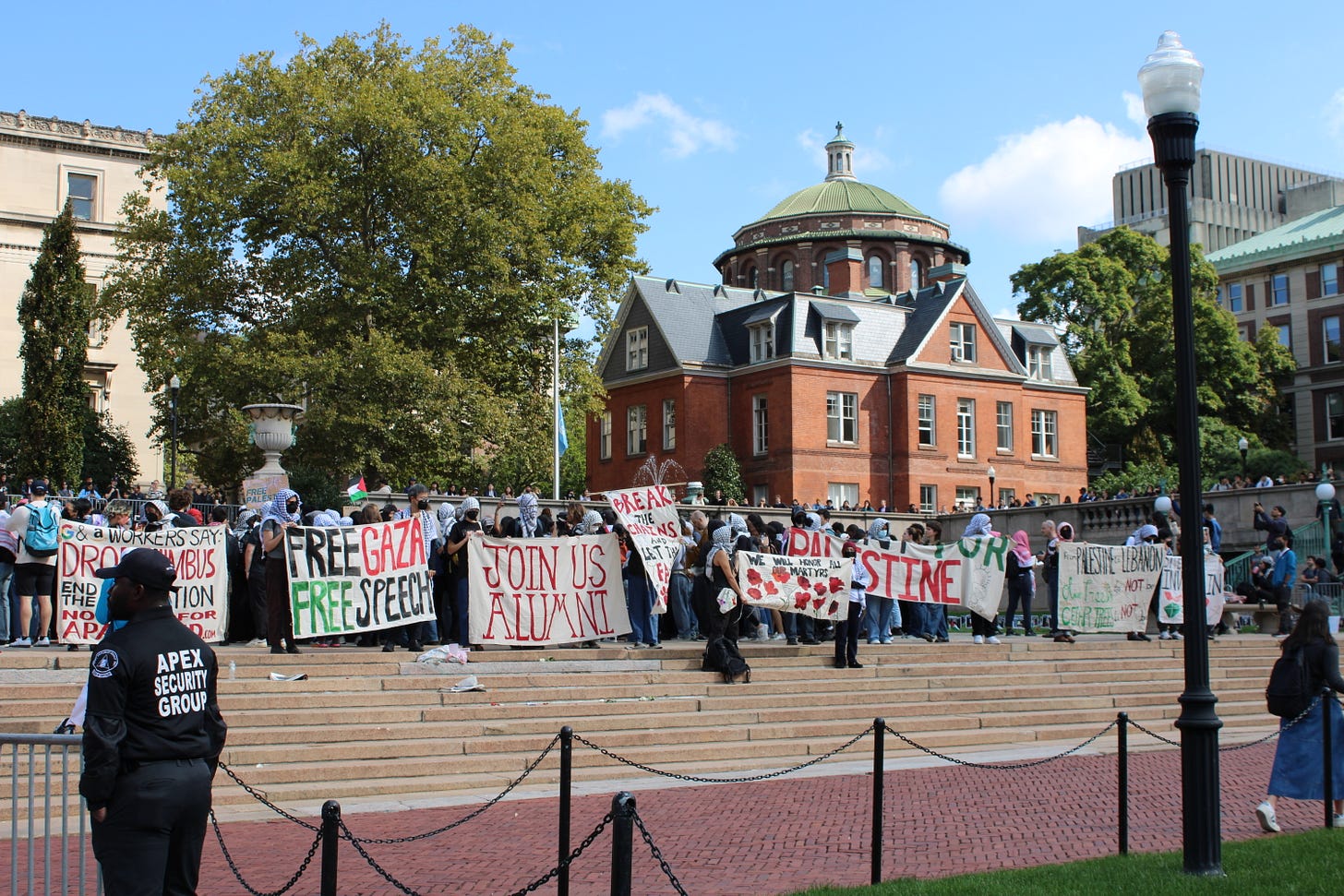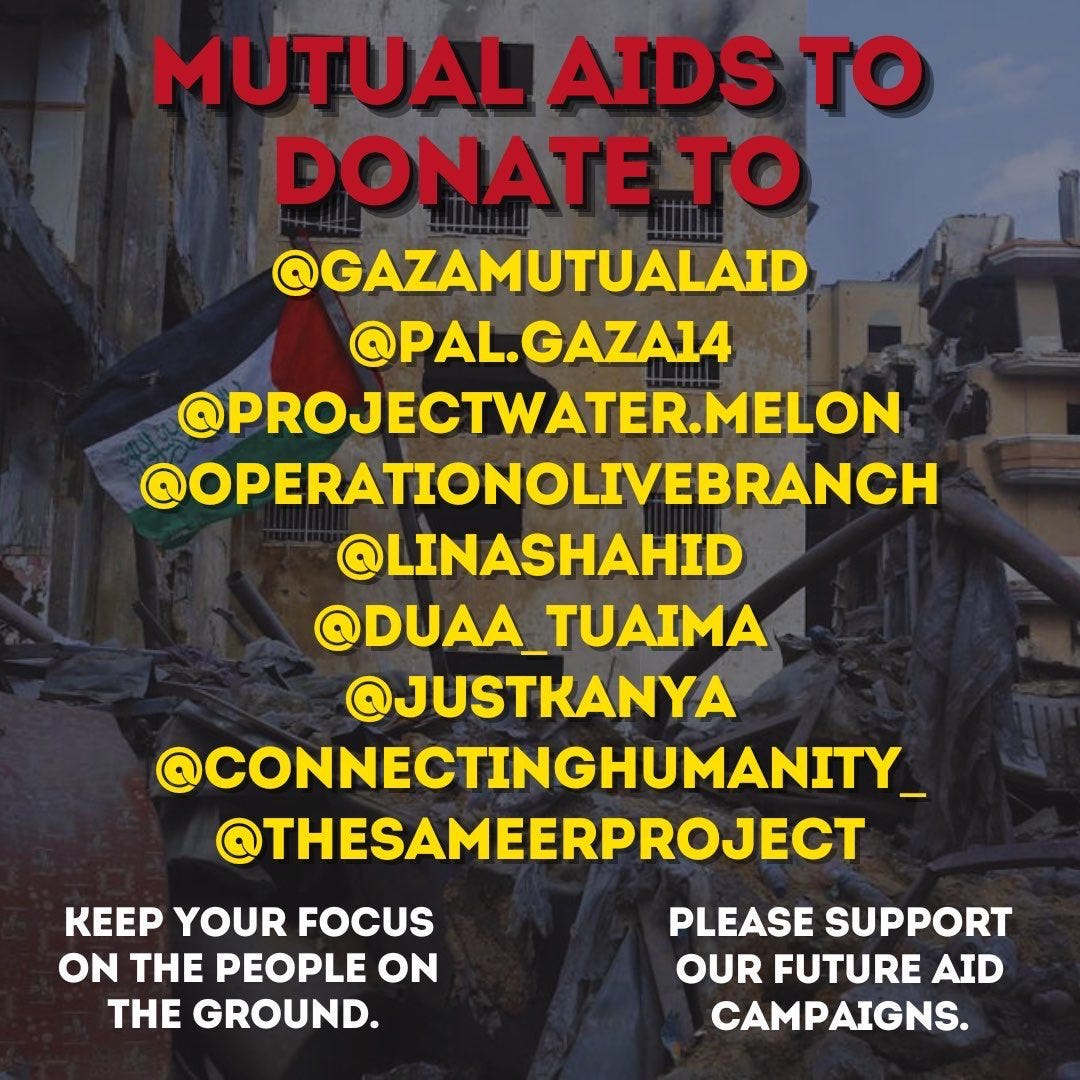Could Your Donation Be Funding Terrorism?
A Sundial investigation reveals that many fundraisers circulating in the Columbia community could be shuttling money to Hamas.
The humanitarian situation in Gaza is dire amidst the ongoing Israel-Hamas War, and Columbia students and organizations, like Columbia University Apartheid Divest (CUAD), have mobilized to raise money for nonprofits and mutual aid pages.
But where in Gaza is this money going? A Sundial investigation reveals that several of CUAD’s fundraising partners have ties to terror-linked groups and U.S.-sanctioned entities.
First, CUAD, on numerous occasions, has collaborated with @savesheikhjarrahnow on Instagram, an influencer with more than 114,000 followers known to post content promoting the “axis of resistance.” Most recently, CUAD and @savesheikhjarrahnow made a collaborative post on September 9 fundraising to “help a pro-Palestinian student activist finish their degree” and stay housed.
Second, on June 18 CUAD promoted a litany of fundraisers supporting Palestinians and humanitarian efforts in Gaza, including Project Watermelon, Lina Shahid, and Operation Olive Branch.
Some of the funds raised from these groups make their way to Gaza through a food kitchen called Ibrahim for Gaza. These organizations and individuals, including @savesheikhjarrahnow, have all promoted or collaborated with Ibrahim for Gaza, led by Ibrahim Ayyash.
From their Instagram page, there is no doubt that Ibrahim for Gaza engages in impactful humanitarian work—their videos and images show a food kitchen that regularly feeds families in Gaza and distributes essential humanitarian supplies.
However, for an ostensibly humanitarian organization, Ibrahim for Gaza has worryingly close ties to Hamas. Ibrahim Ayyash is the brother of Mustafa Ayyash, the founder and director of the Gaza Now news agency. On March 27, the United States Department of the Treasury sanctioned Gaza Now and Mustafa Ayyash for “fundraising for Hamas.” They are accused by both the U.S. and the United Kingdom of acting as “key financial facilitators” in a “Hamas-aligned terrorist fundraising network.”
On Instagram, Ibrahim Ayyash has publicly acknowledged that his brother is Mustafa Ayyash, and has posted in support of him. In June, Ibrahim wrote that Mustafa is a “journalist who works in secret” and “works tirelessly and persistently in publishing events and news inside the Gaza Strip.” In January (before the sanctions), Ibrahim for Gaza posted a video featuring what appears to be a baby formula distribution cosponsored by Gaza Now.
Sundial has also found that at least eight individuals on Ibrahim for Gaza’s team appear to be a part of Gaza Now’s operations and are visible in social media posts from both organizations. Ibrahim Ayyash himself appeared in a since-deleted video showcasing a Gaza Now event.
Sundial was able to identify journalist Hossam Shabat as one of the individuals. The IDF has named Shabat as a sniper for Hamas, based on documents it found in the Gaza Strip. Shabat appeared in a promotional video posted to Ibrahim for Gaza’s secondary Instagram account in January, and he was also photographed distributing food in a Gaza Now post on X from July.
Ibrahim himself has expressed support for Hamas. On October 7, 2023, he wrote on Facebook, “Oh, the power of God!! Oh, God, bless and protect our youth” (translated from Arabic).
CUAD and its fundraising partners appear either oblivious or neglectful of these links. Project Watermelon’s GoFundMe, which has raised nearly $200,000, lists Ibrahim for Gaza as a food kitchen they sponsor. Lina Shahid runs an Instagram account, Dahnoun Mutual Aid, which has promoted Ibrahim for Gaza as recently as August. (CUAD has also directly collaborated with Dahnoun Mutual Aid. On August 23, they made a collaborative post highlighting food distribution in North Gaza.)
Operation Olive Branch, a “grassroots movement to support & amplify aid requests for Palestinian families,” maintains an extensive spreadsheet aggregating various mutual aid funds and NGOs. “Ibrahim’s Kitchen” is one of them—the spreadsheet links to the same PayPal account Ibrahim for Gaza has on their Instagram profile. Operation Olive Branch also helped bolster the Scotland-based Perinatal Project which fundraised for Ibrahim multiple times, most recently in August.
Notably, Operation Olive Branch’s spreadsheet also includes a prominent link to “Donate DIRECTLY to Gaza Municipality to provide WATER.” The link is to what appears to be an official government fundraiser to support government services like “water supply, waste management, and sewage treatment.” The leadership of Gaza Municipality is appointed by Hamas.
For terrorist organizations looking to fundraise, a convoluted money trail is normal. “That’s kind of the MO of these groups,” David May, a senior research analyst at the Foundation for Defense of Democracy, told Sundial. “If they’re trying to mask the money trail, that’s what they’ll do.”
“There's actually a pretty significant constellation of NGOs that are set up actually just as fronts to either to raise money for Hamas to send to there or to do Hamas' bidding in the West,” May added.
Some groups, May says, do operate altruistically, like the World Central Kitchen. Even so, it’s almost impossible to “send the money there without that money aiding the Hamas budget.”
CUAD-promoted funds with connections to Ibrahim for Gaza or Gaza Municipality have raised at least $2.2 million. The Gaza Municipality campaign promoted by Operation Olive Branch has raised more than $812,000. Operation Olive Branch’s GoFundMe, which also supports the Perinatal Project, has raised more than $760,000. Project Watermelon claims to have raised around $480,000 as of August, including nearly $200,000 from its GoFundMe. Dahnoun Mutual Aid said it raised over $242,000 as of August.
It’s unclear what proportion of the funds are transferred to Ibrahim for Gaza, and what proportion of funds Ibrahim for Gaza shares with Gaza Now. Ibrahim for Gaza has directly raised at least $275,000, much of which is from fundraising pages that are now suspended.
“The best case scenario is that they're providing the humanitarian need, whether it be food or shelter or whatever else needs to be provided, and then none of the money will actually go into Hamas’s pockets,” he said. “But that's the best case scenario. In many of these cases, Hamas takes a pretty big cut off the top. They’ve basically run a racket. So if you're operating there, you have to bribe officials, you have to grease the wheels.”
“Any time you operate in any territory—but in particular in Gaza—run by a terrorist group, there's an extreme amount of vetting that has to go in,” May said. “It's pretty clear that there's none of that going on with any of these grassroots fundraising efforts.”
CUAD did not respond to a request for comment.
The Bigger Picture
It is in Columbia’s pro-Palestinian movement’s interest to distance themselves from both potential and established supporters of terror.
For much of this year, Columbia and its student groups have been under elevated scrutiny, especially after CUAD endorsed “armed resistance” and called the October 7 Hamas attacks a “moral, military and political victory.” On October 15 this year, the U.S. sanctioned the Samidoun Palestinian Prisoner Solidarity Network for functioning as “a sham charity that serves as an international fundraiser for the Popular Front for the Liberation of Palestine (PFLP) terrorist organization.” The Institute for the Study of Global Antisemitism and Policy reported that groups including Samidoun have funneled over $3 million annually to pro-Palestinian campus groups, fueling last year’s protests.
The U.S. also sanctioned Khaled Barakat for being a member of the PFLP and a key figure in Samidoun. Barakat was a panelist at CUAD’s “Resistance 101” event in March, where he spoke about his “friends and brothers in Hamas, Islamic Jihad, the PFLP” and his wife Charlotte Kates said “there is nothing wrong with being a member of Hamas.”
Potential links between CUAD’s humanitarian partners and terror-linked entities in Gaza are yet another worrisome failure of due diligence. CUAD’s recent statements endorsing Hamas’s violence, however, call into question whether they are interested in proper due diligence at all.
It is admirable to contribute financially to a humanitarian cause, but for a movement that once pledged to support “critical thinking,” there seems to be a great deal of faith that the money will always end up in the right place. Students who thought they were supporting a desperate Palestinian family may instead be inadvertently channeling funds to terrorists that perpetuate the war, worsening the humanitarian situation for the very people they intended to help.
November 11 Update: After Sundial published this investigation, Ibrahim for Gaza’s main Instagram account was temporarily suspended. Their PayPal and Venmo accounts were also blocked from receiving new donations, according to a post on Ibrahim for Gaza’s secondary Instagram account.
Editor’s note: This article has been updated from the October print issue to reflect additional information about shared staff between Ibrahim for Gaza and Gaza Now. It has also been updated with additional information about the amount of money the various campaigns have raised.
Mr. Engel is a senior at Columbia College studying history and a staff writer for Sundial.















Jack, thank you for your insightful investigative journalism. Truly, you as well as the rest of the Sundial staff are doing amazing work and I cannot wait to read more of your articles.
Jack, you should investigate the link in your Instagram bio for terrorism, too. Disgusting racist.